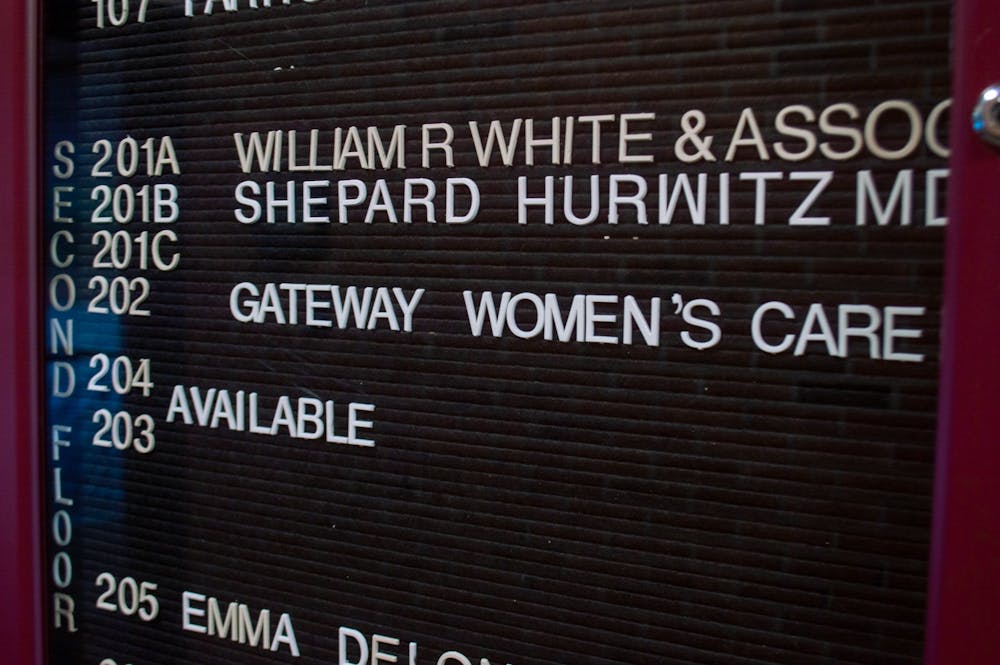They do not, however, provide abortions.
PSS Executive Director Cindy Kouhout said she finds the work her organization does to be vital in educating individuals about their options. PSS is a Christian CPC, like many pregnancy centers.
“It is such a difficult, challenging decision for any woman to make, so to have that safe place where you can just sit and tell your story and not have someone tell you what to do, that is one of the things that I love about PSS,” Kouhout said.
Lynette Drewery said she had an unplanned pregnancy 16 years ago and was looking for an abortion until PSS counseled her on other options.
“Knowing that there was a place like them that I could go to when I eventually decided to keep the child, then it was actually a no-brainer,” Drewery said. “I didn't feel so trapped — with no options but abortion. So it was great having them because the world seemed a little bit bigger after talking with them.”
After learning about the options beyond abortion, Drewery said she used PSS' post-pregnancy care. She said her family was low-income, so PSS provided her with material support like clothes and diapers after she gave birth to her child.
PSS offers free support, which Kouhout said is made accessible by private donors, churches and Christian organizations’ financial support.
She added that the funds PSS receives allows the organization to pay for transportation to their locations in Chapel Hill and Durham, which may not be accessible for low-income communities.
Drewery said she is happy she had access to PSS’ services when deciding to have her son, as well as to support him effectively once he was born.
“My son is 16, and he goes to Durham Tech's Middle College," Drewery said. "He's an amazing individual, and I feel like I was the one blessed to be able to carry him and bring him to the world and raise him."
Controversy around CPCs
According to the American Medical Association Journal of Ethics, most CPCs do not have a medical license and lack licensed medical professionals on-site, leading to the spread of misinformation.
To get the day's news and headlines in your inbox each morning, sign up for our email newsletters.
Misinformation has led to the inaccurate attribution of abortion procedures to serious mental health problems and cancer. CPCs’ unlicensed status also allows them to avoid HIPAA or patient confidentiality laws.
Molly Rivera, the communications director for Planned Parenthood South Atlantic, said she is skeptical of pregnancy centers’ practices.
“They are by and large religiously affiliated and explicitly anti-abortion and solely exist in order to dissuade people from obtaining an abortion, and the majority of that spread misinformation about abortion care,” Rivera said. “They often mirror abortion provider aesthetics in order to trick people into coming there instead of the abortion clinic, and they often lie about the services they provide.”
Individuals must attend religious classes or workshops to receive support from some CPCs, which Rivera said violates religious freedom.
“They often say that they are there to do things like provide free diapers to new parents or provide parenting classes, which on its face is a good thing,” she said. “What they neglect to tell you is that these services come with strings attached.”
Maya Hart, the North Carolina coordinator of SisterSong Women of Color Reproductive Justice Collective, said marginalized groups like low-income and BIPOC communities have historically faced violence from systems like the medical field.
BIPOC people often experience exploitation and dishonesty within the medical industry due to racially-motivated stereotypes, such as being less vulnerable to pain. Due to these stereotypes, some healthcare professionals lie or withhold treatments that can minimize pain for BIPOC individuals.
“These people are already entering these decisions and these environments with a certain amount of fear, rightfully so, because of the way historically-oppressed communities are already treated,” they said. “When they show up to a place in this really vulnerable position and are shamed or told explicitly racist lies, that further perpetuates the violence that the same communities are already facing.”
Hart added that the stigmatizing language around abortion and other parenting styles within these religious workshops contributes to the oppression of queer and transgender communities.
They said providing information, support, comfort and affirmation should be prioritized over judgement and stigma in these situations.
“When it comes to ideas around parenting and giving birth, there's already so much stigma against queer people and being told, ‘You're wrong' or 'You're gross,’ and that's not true,” Hart said.
While these requirements exist for many pregnancy centers, Kouhout said PSS doesn’t have criteria that must be met.
She said she recognizes the value of the classes but believes access to diapers and other post-pregnancy essentials is critical.
“Our ladies and our families are struggling in so many ways, I don't want to put one more barrier in their way,” she said.
Kouhout said she understands there is a lot of uncertainty regarding CPCs. However, she said she encourages open discussion.
@gowriabhinanda
@DTHCityState | city@dailytarheel.com



